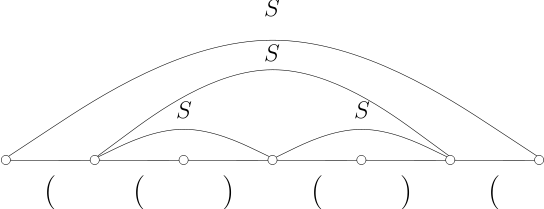Homework 03
Due Monday, 24th October, 10:15am. Please hand in before the lecture.
Problem 1
A grammar has a cycle if there is a non-terminal  such that
such that  , i.e. it is possible to derive the nonterminal A from A by a sequence of production rules.
, i.e. it is possible to derive the nonterminal A from A by a sequence of production rules.
- Show that an LL(1) grammar must have no cycles. Recall, that an LL(1) grammar is one for which a predictive parser needs just one look-ahead symbol.
- Give an algorithm that eliminates cycles in a context-free grammar.
Problem 2
Show that if a grammar is in Chomsky normal form then the parse tree for a word of length  has exactly
has exactly  interior nodes.
interior nodes.
Problem 3
Assume a grammar in Chomsky normal has  non-terminals. Show that if the grammar can generate a word with a derivation having at least
non-terminals. Show that if the grammar can generate a word with a derivation having at least  steps, then the recognized language should be infinite.
steps, then the recognized language should be infinite.
Problem 4
Assume that we want to use the CYK algorithm for the grammars which are not in Chomsky normal form. For example, consider the following grammar for balanced parenthesis:
S -> ( S ) S -> SS S -> ()
The diagram below shows the parsing for "(()())" using CYK.
What is the complexity of the CYK algorithm in this case? Describe why it is not a good idea to use CYK for arbitrary grammars not in the Chomsky normal form.
Problem 5
Let {a, b} be terminals, and {A, B} non-terminals. A production is called linear if it is of the form A → aBb. In other words, if the right hand side can contain only one non-terminal. Show that there are context free languages for which no linear grammar exists.
